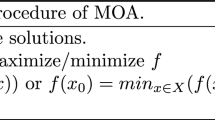Abstract
Evolutionary algorithms usually require a large number of objective function evaluations before converging to a good solution. However, many real-world applications allow for only very few objective function evaluations. To solve this predicament, one promising possibility seems to not evaluate every individual, but to just estimate the quality of some of the individuals. In this paper, we estimate an individual’s fitness on the basis of previously observed objective function values of neighboring individuals. Two estimation methods, interpolation and regression, are tested and compared. The experiments show that by using fitness estimation, it is possible to either reach a better fitness level in the given time, or to reach a desired fitness level much faster (roughly half the number of evaluations) than if all individuals are evaluated.
Similar content being viewed by others
Author information
Authors and Affiliations
Corresponding author
Rights and permissions
About this article
Cite this article
Branke, J., Schmidt, C. Faster convergence by means of fitness estimation. Soft Computing 9, 13–20 (2005). https://doi.org/10.1007/s00500-003-0329-4
Published:
Issue Date:
DOI: https://doi.org/10.1007/s00500-003-0329-4




